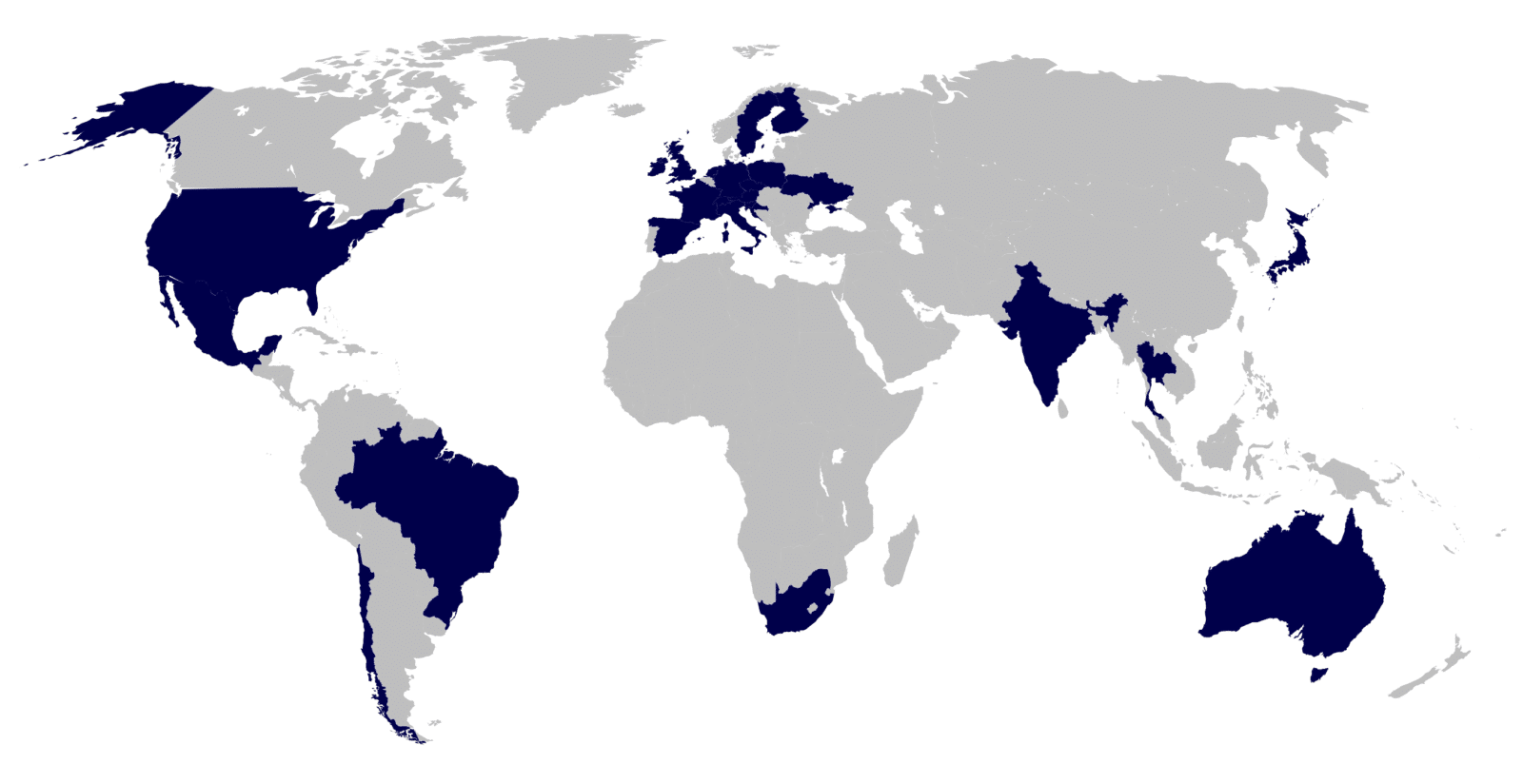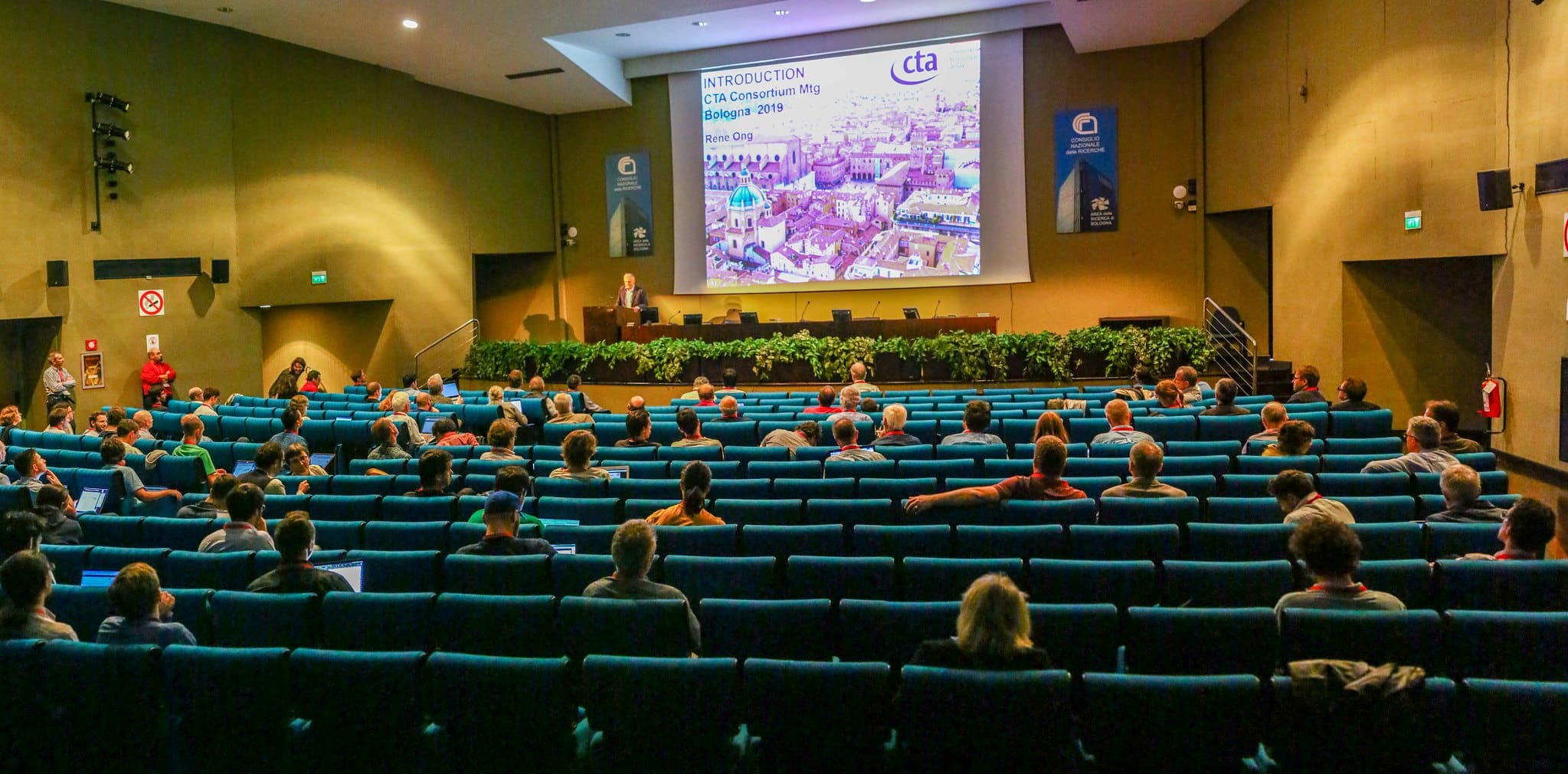The CTAO Consortium
The CTAO Consortium (previously known as CTAC) has developed and detailed the CTAO’s key science goals (see Science with the Cherenkov Telescope Array) and will be responsible for the science analysis and publication of scientific results of the Key Science Projects, ensuring that the CTAO produces legacy data sets and data products for use by the entire community.
The Speakers and Publications Office (SAPO) is responsible for reviewing all Consortium publications and contributions to conferences (i.e. abstracts, talks and proceedings). Learn more about CTAO Consortium publications in the Library.
Contacts:
Spokesperson: Werner Hofmann
Co-Spokesperson: Rene Ong
Chair, CTAO Consortium Board: Vitor de Souza
Member Institutes

Centro Brasileiro de Pesquisas Físicas
Centro de Ciências Naturais e Humanas – Universidade Federal do ABC
Departamento de Engenharias e Exatas, Universidade Federal do Parana
Escola de Artes, Ciências e Humanidades, Universidade de São Paulo
Escola de Engenharia de Lorena, Universidade de São Paulo
Instituto de Astronomia, Geofísico, e Ciências Atmosféricas
Instituto de Física de São Carlos, Universidade de São Paulo
Instituto de Física – Universidade de São Paulo
International Centre for Theoretical Physics, Universidade Estadual Paulista
Nucleo de Astrofisica Teorica, Universidade Cruzeiro do Sul
Núcleo de Formação de Professores – Universidade Federal de São Carlos
APC, Univ Paris Diderot, CNRS/IN2P3, CEA/lrfu, Obs de Paris, Sorbonne Paris Cité, France
Institut de Planétologie et d’Astrophysique de Grenoble, INSU/CNRS, Université Joseph Fourier
Institut de Recherche en Astrophysique et Planétologie
Laboratoire d’Annecy-le-Vieux de Physique des Particules, Université de Savoie, CNRS/IN2P3
Laboratoire Leprince-Ringuet, École Polytechnique (UMR 7638, CNRS)
Laboratoire Univers et Particules de Montpellier, Université Montpellier 2, CNRS/IN2P3
LPNHE, University of Pierre et Marie Curie
Department of Physics, Humboldt University Berlin
Department of Physics, TU Dortmund University
Deutsches Elektronen-Synchrotron
Institut für Astronomie und Astrophysik, Universität Tübingen
Institut für Theoretische Physik, Ruhr-Universität Bochum
Institute for Theoretical Physics and Astrophysics, Universität Würzburg
Institut für Physik & Astronomie, Universität Potsdam
Landessternwarte, Universität Heidelberg
Max-Planck-Institut für Kernphysik
Max-Planck-Institut für Physik
Universität Erlangen-Nürnberg, Physikalisches Institut
Universität Hamburg, Institut für Experimentalphysik
IAPS – Istituto di Astrofisica e Planetologia spaziali
INAF – Istituto di Astrofisica Spaziale e Fisica Cosmica di Palermo
INAF – Istituto di Radioastronomia
INAF – Osservatorio Astrofisico di Arcetri
INAF – Osservatorio Astrofisico di Catania
INAF – Osservatorio Astronomico di Bologna
INAF – Osservatorio Astronomico di Brera
INAF – Osservatorio Astronomico di Capodimonte
INAF – Osservatorio Astronomico di Padova
INAF – Osservatorio Astronomico di Palermo
INAF – Osservatorio Astronomico di Roma
INAF – Osservatorio Astronomico di Trieste and INFN Sezione di Trieste
INAF – Telescopio Nazionale Galileo
INFN – Laboratori Nazionali del Gran Sasso
INFN – Sezione di Catania
INFN – Sezione di Napoli
INFN – Sezione di Perugia
INFN – Sezione di Roma La Sapienza
INFN – Sezione di Roma Tor Vergata
INFN – Sezione di Torino
Istituto di Astrofisica Spaziale e Fisica Cosmica- Bologna
Istituto di Astrofisica Spaziale e Fisica Cosmica – Milano
IUSS – Istituto Universitario di Studi Superiori di Pavia
Università degli Studi di Bari and INFN Sezione di Bari
Universitá degli Studi di Padova and INFN
Università degli Studi di Siena (DSFTA)
Università degli Studi di Torino
Department of Applied Physics, University of Miyazaki
Department of Earth and Space Science, Graduate School of Science, Osaka University
Department of Physical Science, Hiroshima University
Department of Physics and Astrophysics, Nagoya University
Department of Physical Sciences, Aoyama Gakuin University
Graduate School of Science, University of Tokyo
Department of Physics, Kindai University
Department of Physics, Konan University
Department of Physics, Kyoto University
Department of Physics, Rikkyo University
Department of Physics, Tokai University
Department of Physics, Yamagata University
Faculty of Science and Engineering, Waseda University
Faculty of Management Information, Yamanashi-Gakuin University
Faculty of Science, Ibaraki University
Graduate School of Science and Engineering, Saitama University
Hiroshima Astrophysical Science Center, Hiroshima University
Institute for Cosmic Ray Research, University of Tokyo
Institute for Space-Earth Environmental Research (ISEE), Nagoya University
Institute of Particle and Nuclear Studies, KEK (High Energy Accelerator Research Organization)
Institute of Space and Astronautical Sciences, JAXA
Institute of Socio-Arts and Sciences, University of Tokushima
Kobayashi-Maskawa Institute (KMI) for the Origin of Particles and the Universe, Nagoya University
Riken, Institute of Physical and Chemical Research
School of Allied Health Sciences, Kitasato University
Tokai University Hospital
Academic Computer Centre CYFRONET AGH
Copernicus Astronomical Center, Polish Academy of Sciences
Faculty of Physics, Astronomy and Applied Computer Science, Jagiellonian University
Faculty of Physics and Astronomy of the University of Zielona Góra
Faculty of Physics and Applied Computer Science, University of Lódź
Faculty of Physics, University of Warsaw
National Centre for Nuclear Research, Warsaw
Space Research Centre, Polish Academy of Sciences
The Henryk Niewodniczański Institute of Nuclear Physics, Polish Academy of Sciences
Toruń Centre for Astronomy, Nicolaus Copernicus University
University of Białystok, Faculty of Physics
Centro de Investigaciones Energéticas, Medioambientales y Tecnológicas (CIEMAT)
Departament d’Astronomia i Meteorologia, Institut de Ciències del Cosmos, Universitat de Barcelona
Escuela Politécnica Superior de Jaén, Universidad de Jaén
Grupo de Altas Energías, Universidad Complutense de Madrid.
Grupo de Electronica, Universidad Complutense de Madrid
Instituto de Astrofísica de Canarias
Instituto de Astrofisica de Andalucia (CSIC)
Institut de Ciències de l’Espai (IEEC-CSIC) and Institució Catalana de Recerca I Estudis Avançats (ICREA)
Institut de Física d’Altes Energies – The Barcelona Institute of Science and Technology
Port d’Informació Científica (PIC)
Universidad de Alcalá – Space & Astroparticle group. Facultad de Ciencias
Armagh Observatory and Planetarium, Northern Ireland
Centre for Astrophysics Research, Science & Technology Research Institute, University of Hertfordshire
Department of Physics and Centre for Advanced Instrumentation, Durham University
Department of Physics and Astronomy, University of Leicester
Department of Physics and Astronomy, University of Sheffield
King’s College London
Queen’s University Belfast
School of Physics & Astronomy, University of Edinburgh
School of Physics and Astronomy, University of Nottingham
School of Physics & Astronomy, University of Southampton
STFC Rutherford Appleton Laboratory
University of Bath
Astronomy Department, Adler Planetarium and Astronomy Museum
Department of Physics and Astronomy and the Bartol Research Institute, University of Delaware
Department of Physics and Astronomy, Barnard College; Department of Physics, Columbia University
Department of Physics and Astronomy, Iowa State University
Department of Physics and Astronomy, University of California, Los Angeles
Department of Physics and Astronomy, University of Utah
Dept. of Astronomy & Astrophysics, Pennsylvania State University,
Department of Physics, Purdue University
Department of Physics, Washington University
Enrico Fermi Institute, University of Chicago
Harvard-Smithsonian Center for Astrophysics
School of Physics and Astronomy, University of Minnesota
School of Physics and Center for Relativistic Astrophysics, Georgia Institute of Technology
University of Alabama in Tuscaloosa – Department of Physics and Astronomy
University of Hawai’i at Manoa
University of California, Davis
University of Iowa, Department of Physics and Astronomy


